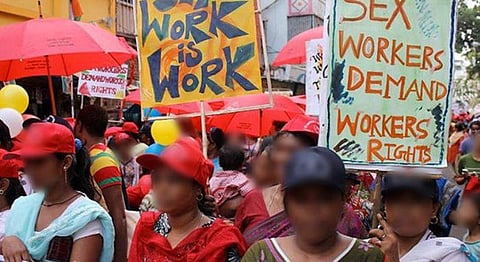
- HOMEGROWN WORLD
- #HGCREATORS
- #HGEXPLORE
- #HGVOICES
- #HGSHOP
- CAREERS
- ABOUT US
- CONTACT US

In the year 1956, the Indian parliament passed the ‘The Immoral Traffic (Prevention) Act’ in order to prevent immoral trafficking activities that directly affect women and young girls in the country. Nearly 30 years later, an amendment to this original act criminalised women soliciting sexual services. This particular law has subsequently gone on to shape how the profession has marginalised the community and stripped its patrons of fundamental legal protection that any other working professional in the nation is entitled to.
The law intentionally bans organised sex work, identifies brothels and similar spaces as illegal and criminalises those who are willingly consenting to participate in the activity.
Over decades the sex workers of the country continued to live in the shadows, attempting to sustain a livelihood in the already harsh and ruthless working conditions that they are exposed to. From untoward prosecution from the society, ostracisation and a lack of immunity from the government, the community continues to lead a life of uncertainty, danger and anxiety.
A Momentous Victory
In the latest developments on legalising the profession in the country, the Supreme Court as of yesterday has made a pivotal announcement in decriminalising sex work in the nation. The news has sparked several heated dialogues and debates online on what this could hold for the future of Indian society.
The Centre’s change comes with several much-required changes. For starters, sex workers will now be entitled to equal legal protection. This is a momentous change that can transform the way in which criminal acts against the community are been dealt with going forward. Other mandates that were passed in this amendment include:
I. Offering immediate medical assistance and other grievance coping services to workers who have experienced sexual assault.
II. The police forces are to treat the community with dignity by not engaging in any physical, sexual or verbal abuse/coercion.
III. Any and all criminal complaints filed by a sex worker will be processed with due diligence keeping legal protocols in place
IV. If a brothel is raided, immunity will be provided to sex workers against their arrest, penalisation and harassment.
What Could This Mean For India?
Excluding consenting adults from the ambit of this law comes as a historic victory for the community that has been reeling under years of marginalisation and oppression. With this move, India joins a tiny league of nations that openly legalises sex work as a viable profession. This landmark judgement could usher in a transformation in not just India’s treatment of the community but also initiate a shift in the way we view marginalised communities at large.
If you enjoyed reading this, we also suggest:
